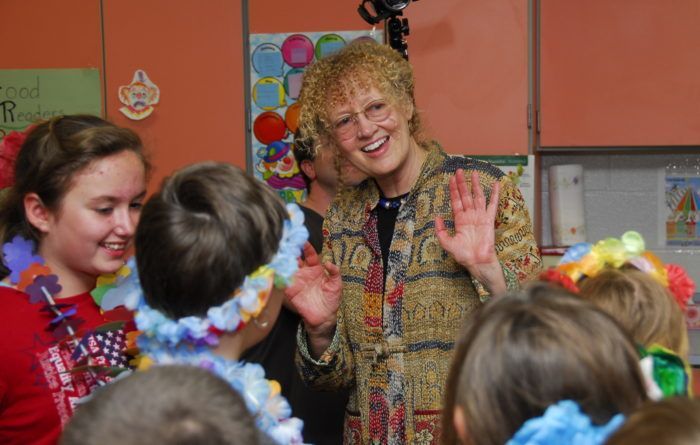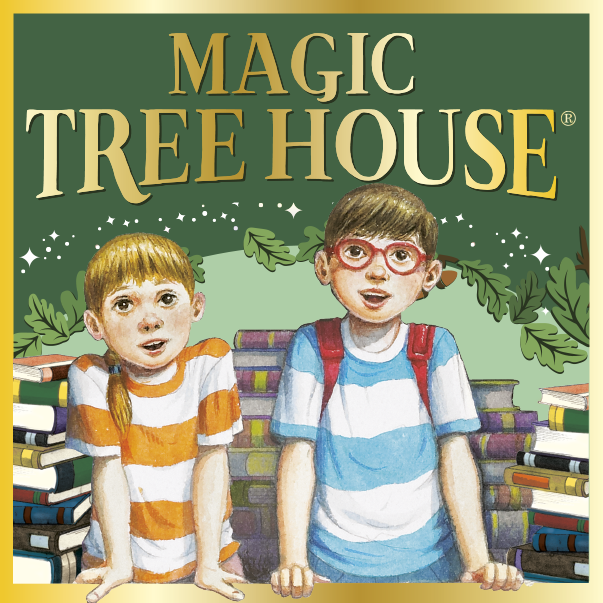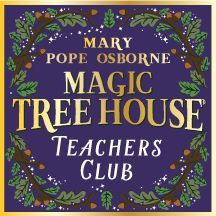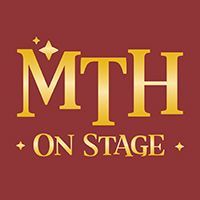Mary's Q & A with FirstBook.org

Authored by
Melanie Boyer on November 7, 2017
POSTED IN: EXPERT VOICES
The Magic Whistle? Before deciding on a tree house, author Mary Pope Osborne considered a whistle, a museum, and an art studio.
A note from Kyle Zimmer, president and CEO, First Book:
This year, First Book is celebrating our 25th year of providing brand new books and educational resources to educators serving kids in need. Today, we are so delighted to share that celebration with a very special First Book friend who’s also marking 25 years: Mary Pope Osborne, the beloved author of the award-winning “Magic Tree House” series of books, which she started writing 25 years ago. Since that time, “Magic Tree House” has been translated into more than 33 languages and has sold more than 135 MILLION copies worldwide! Mary has also been an avid supporter of First Book, working side-by-side with us to distribute millions of copies of her books to the children and educators we serve. Mary – thank you for helping us ring in our 25th year, in part by celebrating your 25 years of creating magic for millions of children.
Find “Magic Tree House” titles and companion Fact Trackers on the First Book Marketplace
Follow “Magic Tree House” on Facebook and Mary Pope Osborne on Twitter
Q&A With First Book
First Book (FB): First Book is delighted to partner with you and your Classroom Adventures Program which supports so many educators serving students in Title I schools across the country. Can you tell us how long the program has been around and what inspired you to create such an enriching way to spark an interest in reading?
Mary Pope Osborne (MPO): During the first 10 years of writing “Magic Tree House” books, I traveled to hundreds of schools around the country. Educators were very enthusiastic about the books and often told me the series was getting many of their kids to read – and to love reading. Teachers inspired me to keep writing the series. I often turned to them for advice and feedback as I grew the series. For instance, teachers were enthusiastic of the development of our nonfiction Fact Trackers, and they gave great advice on what subjects to cover.
FB: You traveled a lot as a young person and as a young adult. How have these travels impacted your writing? What advice would you give to aspiring adventurers?
MPO: I grew up in the military, traveling often with my family. As a young adult in the early 1970s, I had an unquenchable wanderlust that sent me halfway around the world with a pack on my back. I traveled for nearly a year from Greece to Nepal, passing through Turkey, Lebanon, Iraq, Iran Afghanistan, Pakistan, Kashmir, India, and Nepal. It was a relatively peaceful time in that part of the world before all the turbulence that erupted in mid to late 70s. Still, I faced a lot of danger, natural disasters, and serious illness – and was lucky to have survived. That wild, adventurous year informs nearly every day of my life…and has contributed greatly to more than two decades of “armchair traveling” with the “Magic Tree House” series. I suggest kids not seek themselves by looking in the mirror or pointing their fingers negatively at others. Turn self-obsessed introspection into action. Be brave and seek the unknown, teach in the inner city, join the military, study or work abroad, spend time in the woods, investigate the sky and ocean, relate deeply to animals, learn lots about history and other cultures. By exploring worlds outside our own, by “loving the world in all its manifestations,” as Tolstoy said, we discover our true selves.
Be brave and seek the unknown, teach in the inner city, join the military, study or work abroad, spend time in the woods, investigate the sky and ocean…”
FB: Your books have meant so much to so many kids around the world. What has been the most rewarding interaction you have had with a young reader?
MPO: Most people don’t have the privilege, as I do, of meeting thousands of six-, seven-, and eight-year-olds. Over the years, all the kids I’ve met have been wonderful. Seriously, I’ve never interacted with even one mean or rude child! I’ve also met many kids who are in crisis: I visited schools in lower Manhattan right after 9/11. I visited children in Japan who’d survived the terrible tsunami of 2008. I visited with New Orleans children after Katrina. I’ve met with children from orphanages and spent time with critically ill children through the Make-A-Wish Foundation. The surprising news is that children who’ve suffered from disasters have comforted me more than I have comforted them. I find a compassionate quality in early elementary school age children that constantly moves and inspires me. The letters I receive from kids also display a giving spirit. Kids often try to make me feel good – they praise me and try to build my confidence. One of my favorite recent letters was from a boy who wrote that he’d never actually read any of my books, but maybe he would someday. He signed the letter: “Your greatest fan.” I also love that children send me their own creative works – illustrations and stories. One of the first times I ever spoke to a class of children, a third-grade boy squeezed through the raucous crowd around me to whisper in my ear, “Mrs. Osborne, you may not know this, but I’m an author, too.”
FB: Do students inspire your work?
MPO: Young readers certainly inspire my work. I identify easily with kids, probably because I loved my own childhood, and in many ways, I’ve never given it up. So, it’s always fun for me to enter the world of Jack and Annie. What will they do next? Where in time and space will they go? What will they see? How will they react? What will they learn? The kids I meet — their enthusiasm about the series and their curiosity about Jack’s and Annie’s world — propel me to keep asking these questions, even after 55 books.
FB: It can be hard to know which ideas are brilliant and which should probably go in the trash bin. How do you decide on which of your ideas/inspirations to pursue or keep exploring?
MPO: I love to throw away inert ideas and bring in new ones. When I was trying to get the series off the ground, I spent over a year, working on different time travel manuscripts. I tried writing about a magic cellar, a magic artist studio, a magic museum, and even a magic whistle. Nothing was working, until one day Will and I came across a tree house in the woods of Pennsylvania near our weekend cabin. We started talking about the possibility of Jack and Annie finding a magic tree house that could take them through time and space. That day, a new idea enthusiastically took over—and “Dinosaurs Before Dark” was written soon after. Here’s the irony, though: I think the right idea would never have come along without my having spent a year struggling with many wrong ideas. This pattern happens with each of the books in the series; as I work on a manuscript, I constantly add and subtract elements. I like to tell kids that every “bad” idea is leading to a better one. The important thing is not to give up – and not to hide behind the claim of “writer’s block.” Young writers need to learn how to release plot ideas that don’t honestly excite them or lead anywhere—and how to welcome fresh alive possibilities that inspire them. Paying attention to their own feelings will help them discern which is which.
I like to tell kids that every “bad” idea is leading to a better one. The important thing is not to give up.”
FB: What advice would you give to a child that claims to hate reading?
MPO: First, I would try to find out whether or not the child is truly able to read. I’ve met quite a few children who say they don’t like reading, only to discover they have an undiagnosed reading disability. If a child can read, I would encourage him/her to find a book that fits with their interest. Do they prefer nonfiction? Do they like history or contemporary life? Animal stories? Sports stories? Time-travel? Graphic novels? Comic books? Picture books? Magazines? I think all children should be encouraged to read what they most love to read, no matter how simple it is. Once they discover the joy of reading, their interests will naturally expand and draw them to a broader variety of books.
FB: How has the “Magic Tree House” series grown and developed over the years as a resource for teachers?
MPO: On the 20th anniversary of the series, in collaboration with First Book, I founded the non-profit “Magic Tree House” Classroom Adventures Program. Cindy Mill, the managing director of this MTH program, added a number of educators to our team (which also includes my husband, Will and my sister, Natalie Pope Boyce). As a way of expressing our gratitude to teachers, we promise them the “Gift of Time” and the “Gift of Books.” The “Gift of Time” includes lesson plans for all MTH books, as well as an extensive reading level guide, and a curriculum guide, all free of charge. The “Gift of Books” involves a simple grant process for Title I teachers to get MTH books for their classrooms. Often, performances of one of our Magic Tree House musicals includes giving books to the Title I kids who see the show. It’s been so much fun partnering with educators, First Book folks, and different theaters around the country. Everyone involved seems to relish the idea of bringing more joy to the educational process.
FB: You’ve had an incredibly diverse history of teaching acting, being a travel agent, and even a being medical assistant. If you couldn’t be a writer, what do you think you would you do?
MPO: Hmm. Perhaps be a librarian in a Title I elementary school and have the freedom to make the library a warm, enchanting place – with dioramas, murals, soft lighting, comfortable chairs, classical music, and enticing book displays. In such a place, I’d like to give encouragement to kids, ignite their imaginations, and give them a love of reading. Years ago, I visited a school district on the outskirts of Houston where librarians had created just such magical spaces such as I’ve described.
Or, perhaps be the minister of a country church and sponsor speakers and discussions and study theology and philosophy.
Or teach a course in children’s literature of the 1800s and early 20th century, from Hans Christian Anderson to Kenneth Graham (“Wind in the Willows”) to Beatrix Potter.
Or own a used book store in a quiet New England town and do nothing all day but read – as well as watercolor. I’d serve coffee and tea to book lovers and invite dogs – of which I’d have many, all of them friendly and easy-going – to lie on the rug near a warm winter stove; and I’d encourage my husband and his musician friends to play old-time music in a back room.






